Books and Literature About Farming and Homesteading
Below are some of the books and other general literature we have utilized heavily during our research and learning the basics of livestock and farming. For materials purchased online, links are included to the online catalog (usually Amazon) since that provides more information about the books.
In addition to the books below, many of our research pages link to literature that was helpful for us in regards to that particular topic. The books below are just more general or more intensive sources of information.
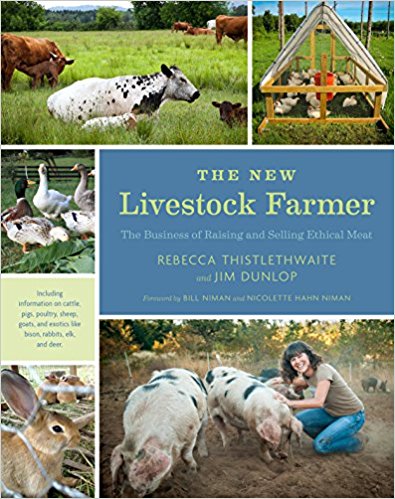 The New Livestock Farmer : The Business of Raising and Selling Ethical Meat. Rebecca Thistlethwaite and Jim Dunlop. 2015.
The New Livestock Farmer : The Business of Raising and Selling Ethical Meat. Rebecca Thistlethwaite and Jim Dunlop. 2015.
This is an excellent introductory book that covers all types of livestock and differing methods of raising each animal. This includes great information on breeds and animal husbandry including cows, pigs, chickens, ducks, and more exotic animals like bison, rabbits, and deer. This also covers processing, including legal and ethical issues as well as just pragmatic concerns. Just a great wealth of information for a starting farmer.
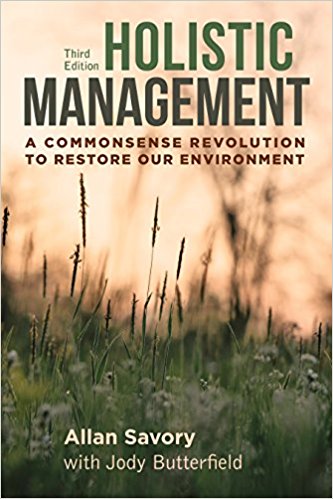 Holisitic Management : A Commonsene Revolution to Restore our Environment. Allan Savory. Third edition. 2016.
Holisitic Management : A Commonsene Revolution to Restore our Environment. Allan Savory. Third edition. 2016.
This book is a great resource to learn some of the introductory concepts of regenerative agriculture. It promotes varied crop laying (versus one crop over many many acres) and rotational intensive grazing of livestock to restore soil health to the land. This discusses Savory's use of livestock to reverse desertification but really has lots of other really useful and handy information on managing your land and caring for your soil.
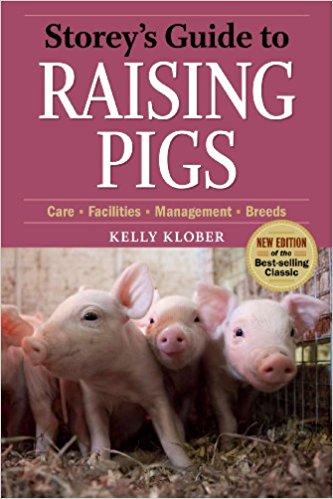 Storey's Guide to Raising Pigs. Kelly Klober. 2009.
Storey's Guide to Raising Pigs. Kelly Klober. 2009.
"Learn how to successfully raise your own pigs. Stressing the importance of sustainable and environmentally friendly farming practices, Kelly Klober provides expert tips on making your hog operation more efficient and profitable. Storey’s Guide to Raising Pigs will give beginners the confidence they need to succeed, while inspiring experienced farmers to try new techniques and experiment with new breeds. " - Amazon book review
A very in-depth look at the different breeds and animal husbandry of pigs on a working farm.
 The Rodale Book of Composting : Easy Methods for Every Gardener. Grace Gershuny. 1992.
The Rodale Book of Composting : Easy Methods for Every Gardener. Grace Gershuny. 1992.
A great resource on the art and science of composting, as well as a discussion of the benefits of composting. In particular, there is a very large section about what is good and what is not good to include in your compost pile. Composting, along with careful use of livestock and intensive rotational grazing, is a great way to build back up your soil. Composting is most certainly a major part of that process, especially on the small scale for our small gardens.
We are very happy to be able to compost again and began our composting pile just a few weeks after purchasing the land.
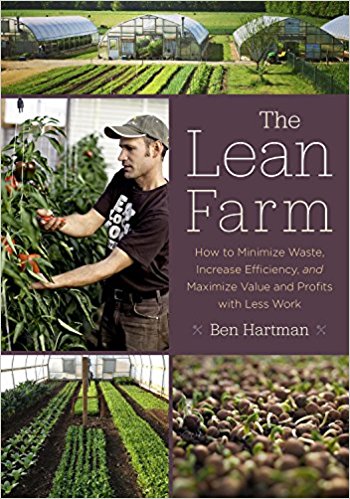 The Learn Farm: How to Minimize Waste, Increase Efficiency, and Maximize Value and Profits with Less Work. Ben Hartman. 2015.
The Learn Farm: How to Minimize Waste, Increase Efficiency, and Maximize Value and Profits with Less Work. Ben Hartman. 2015.
I HIGHLY recommend this book. It is a great book for farmers looking to make more profit or work smarter. In this book, Hartman applies the Toyota method of lean manufacturing to his farm. This helps eliminate waste in general and sparks a review process of all equipment and processes. Each process is examined to ensure that it is adding value to the final product... value as defined by your customers. Equipment that is no longer needed is eliminated to remove waste as well. In the end, Hartman's farm runs leaner, providing more profit and more free time in his life to focus on other important parts of his life.
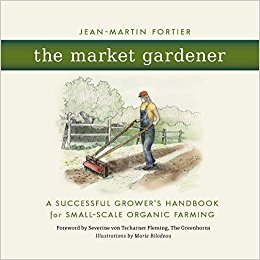 The Market Gardener : A Successful Grower's Handbook for Small-scale Organic Farming. Jean-Martin Fortier. 2014.
The Market Gardener : A Successful Grower's Handbook for Small-scale Organic Farming. Jean-Martin Fortier. 2014.
Another book I HIGHLY recommend. for anyone interested in small-scale market farming. Jane-Martin Fortier (JM) is a pioneer in applying non-till agriculture to small market farms. In this book JM details his approach to prepping beds, planting in a bio-intensive fashion. This information is invaluable for new farmers and provides a wealth of data on how he plants each of many different vegetables.
Wish List
- Restoration Agriculture by Mark Shepard. Around the globe most people get their calories from annual agriculture - plants that grow fast for one season, produce lots of seeds, then die. Every single human society that has relied on annual crops for staple foods has collapsed. Restoration Agriculture explains how we can have all of the benefits of natural, perennial ecosystems and create agricultural systems that imitate nature in form and function while still providing for our food, building, fuel and many other needs - in your own backyard, farm or ranch. This book, based on real-world practices, presents an alternative to the agriculture system of eradication and offers exciting hope for our future.
- Foxfire Series. For over 40 years, high school students in Foxfire programs have helped to gather and publish information about their Southern Appalachian heritage. Best known for the best-selling Foxfire Book series, the series and the other topical titles were all grown from interviews gathered for The Foxfire Magazine. The success of the student-driven program led to professional research that generated the Foxfire Approach to Teaching and Learning and its support materials for use by other educators hoping to achieve similar levels of student involvement and create life-long learners.
- Organic Transition : A Business Planner for Farmers, Ranchers and Food Entrepreneurs. This is available in print or online as a PDF for free from SARE. Recommended by our local ag office.
- Crop Rotation on Organic Farms. This is also available in print or online as a PDF for free from SARE. Once again, recommended by our local ag office.
